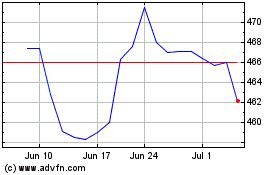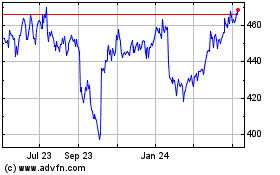Virus Weighs on Lockheed Output -- WSJ
July 22 2020 - 3:02AM
Dow Jones News
By Doug Cameron
This article is being republished as part of our daily
reproduction of WSJ.com articles that also appeared in the U.S.
print edition of The Wall Street Journal (July 22, 2020).
Lockheed Martin Corp. said rising Covid-19 cases are affecting
production of its combat jets and missiles in Texas and Florida,
impacting an industry that had mostly dodged the financial fallout
from the pandemic.
The world's biggest defense company by sales on Tuesday cut its
expected deliveries of F-35 aircraft produced in Fort Worth, Texas,
by 15% for this year. It also flagged delays in shipments of
Hellfire missiles made in Orlando, Fla., because of supply-chain
issues as more workers tested positive and others were sent home as
a precaution.
The defense industry has been one of the U.S. economy's
most-resilient sectors, with its designation as an essential
industry allowing plants to avoid shelter-in-place orders. The
Pentagon also has accelerated contract payments to help the
sector's smaller suppliers.
Despite the production bumps in Texas and Florida, Lockheed
Martin said it doesn't expect the pandemic to have a material
impact on its finances this year. The company raised its 2020 sales
and profit guidance on Tuesday after reporting a forecast-beating
quarterly earnings.
The Pentagon has pledged to cover contractors' additional costs
from continuing work through the pandemic, and it is seeking more
than $10 billion in funding that has yet to be authorized by
Congress. The Pentagon's accelerated payments have helped push cash
through the supply chain to keep component makers afloat through
the pandemic. Lockheed Martin has also continued to hire staff.
Lockheed Martin is estimated by analysts to have incurred $2.5
billion in pandemic-related costs. The company said it assumed such
costs would be recovered, as it forecast per-share earnings this
year would rise to between $23.75 and $24.05, compared with its
previous forecast of $23.65 to $23.95.
The company boosted its order backlog to a record $150 billion
during the latest quarter, and Chief Executive Jim Taiclet said it
is positioned to weather either a flat or declining defense
budget.
Mr. Taiclet, who became CEO last month, said there could be a
silver lining from any downturn in defense spending, saying in an
interview that merger-and-acquisition opportunities could emerge in
areas such as mission systems, as well as partnerships in the 5G
network sector.
Lockheed Martin's second-quarter profit rose to $1.63 billion,
from $1.42 billion a year earlier, and per-share earnings excluding
one-time items climbed to $6.13, above the $5.72 consensus among
analysts polled by FactSet. Sales rose to $16.2 billion from $14.4
billion.
The Bethesda, Md.-based company added $1 billion to the top end
of its forecast for 2020 sales, which are now expected to be
between $63.5 billion and $65 billion, and boosted its closely
watched guidance for free cash flow.
Lockheed Martin shares rose 2.6%.
Write to Doug Cameron at doug.cameron@wsj.com
(END) Dow Jones Newswires
July 22, 2020 02:47 ET (06:47 GMT)
Copyright (c) 2020 Dow Jones & Company, Inc.
Lockheed Martin (NYSE:LMT)
Historical Stock Chart
From Mar 2024 to Apr 2024

Lockheed Martin (NYSE:LMT)
Historical Stock Chart
From Apr 2023 to Apr 2024
